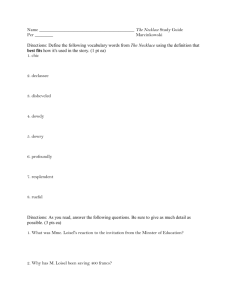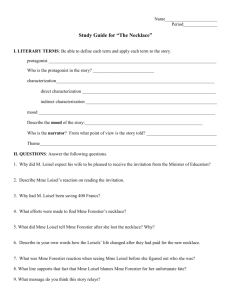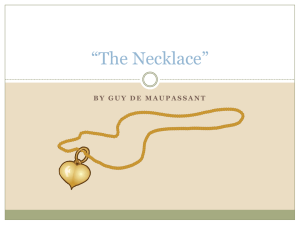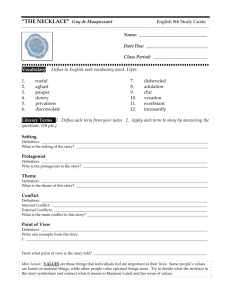The Necklace* Guy de Maupassant
advertisement
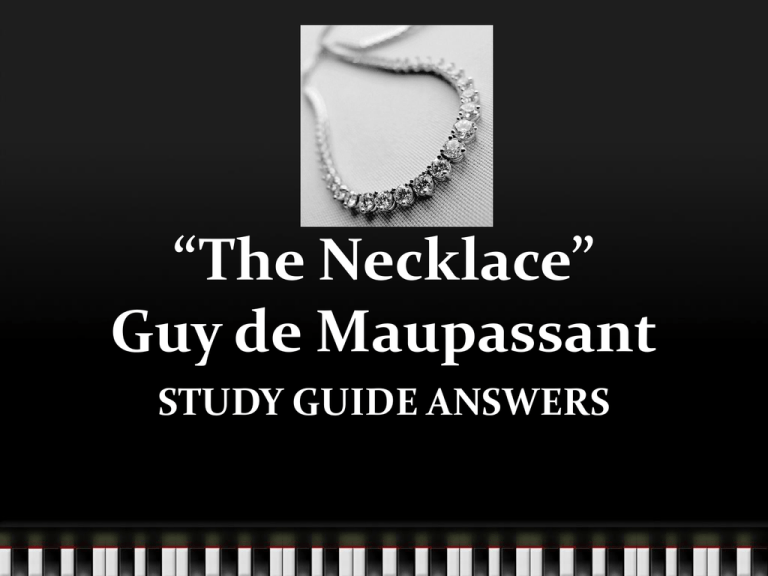
“The Necklace” Guy de Maupassant STUDY GUIDE ANSWERS 1. Find a quote from the story that indicates that Mme. Loisel is not happy in her marriage. “…… and she let herself be married to a little clerk at the Ministry of Public Instruction.” By “letting” herself marry someone, it means her heart wasn’t totally into it. As a result, one can assume she is not happy in her marriage. (especially since she still dreams of another life) 2. According to the narrator, what characteristics of womanhood are able to overcome a lack of money, education, or social status? “ ….and beauty, grace, and charm act instead of family or birth. Natural fineness, instinct for what is elegant, suppleness of wit, are the sole hierarchy, and make from women of the people the equals of the very greatest ladies.” 3. In your own words, how does Mme. Loisel compensate for the modest way of life she lives? Instead of thinking about the simple things in her life which made her miserable, Mme. Loisel thought about all of the luxuries enjoyed by the upper class. 4. What things does Mme. Loisel love? The two things Mme. Loisel loves are dresses and jewels and everything else to do with upper class living. 5. How does Mme. Loisel react to the invitation she receives? Why? Mme. Loisel becomes angry and throws the invitation on the table. She is so upset because she feels that she doesn’t have anything proper to wear to a ball with the upper class. M. Loisel is surprised because he thought his wife, a woman who dreamed constantly about the upper class, would LOVE an invitation like this. This is one of the many times we see how selfLESS he is and how SELFISH she is! 6. What does Mme. Loisel’s husband suggest she wear in place of jewelry? M. Loisel suggested his wife wear natural flowers instead of jewels stating that natural flowers were “very stylish at this time of year.” With each comment Mme. Loisel makes, it shows the reader she is never satisfied with what she has. 7. What does Mme. Loisel wear? A necklace of diamonds 8. Find at least one sentence which shows that, at the ball, Mme. Loisel was in fact charming and beautiful, that her self-image was not completely vain imagination. “ All the men looked at her, asked her name, endeavored to be introduced. All the attaches of the Cabinet wanted to waltz with her. She was remarked by the minister himself.” 9. Why does Mme. Loisel cry out when she looks at herself in the mirror? • Mme. Loisel cries out when she looks at herself in the mirror because she sees that the necklace is gone! 10. List three things M. Loisel does to find the lost necklace. Is he successful? He retraces their steps He goes to the police and cab offices to see if it was turned in He puts an ad in the newspaper offering a reward. He is NOT successful, but once again proves his devotion and loyalty to his wife. 11. What does Loisel then tell his wife she must do? He instructs his wife to write a letter to Madame Forestier saying that the clasp had broken and that it was being repaired. M. Loisel does this to buy them more time to either find or replace the necklace. 12. How is Loisel able to replace the lost necklace? “ Loisel possessed eighteen thousand francs which his father had left him. He would borrow the rest. …He did borrow, asking a thousand francs of one, five hundred of another, five louis here, three louis there. He gave notes, took up ruinous obligations, dealt with usurers, and all the race of lenders. He compromised all the rest of his life, risked his signature without even knowing if he could meet it; and frightened by the pains yet to come, by the black misery which was about to fall upon him, by the prospect of all the physical privations and of all the moral tortures which he was to suffer.” Loisel went through a HUGE deal of trouble to get the money for the necklace his wife lost without thinking about what could happen if he could NOT pay back the loans. 13. How does Mme. Forestier react to Mme. Loisel when she returns the necklace? Mme. Forestier was annoyed with Mme. Loisel because she did not return the necklace sooner. 14. Find one sentence that reveals Mme. Loisel HAD been living in a situation that was not quite as impoverished as her opinion of it. “She came to know what heavy housework meant and the odious cares of the kitchen.” To NOT know what heavy housework or cares of the kitchen were, it means she could have had it much worse. “They dismissed their servant…” Anyone who has a servant definitely does NOT have it THAT bad! 15. How long does it take for the Loisel’s to pay off their debt? It took the Loisels ten years to pay off their debt. 16. How do the years of hard work change Mme. Loisel? Mme. Loisel now seems much older than she had. She is hard, strong, and crude. Her appearance is no longer as beautiful as it was, her skin is weathered from hard labor, and her general manner has become more coarse. 17. What happens when Mme. Loisel meets Mme. Forestier on the Champ Elysees? Mme. Forestier does not even recognize her friend. She then tells Mme. Loisel that the diamond necklace was NOT real and that it was worth no more than 500 francs. An amount that they could have EASILY afforded without any damage to their current status. 18. Mme. Loisel’s reaction… This is an opinion question, but based on what we know about Mme. Loisel, we can probably assume she will consume herself with the lost years for many more FUTURE years being that she is not one to let go of things. She will also probably never stop dreaming about “the good life.” 19. What point of view is this story told in? This story is told in third person limited omniscient point of view. The narrator is not part of the story, but knows the thoughts and feelings of SOME, not all, characters. 20. Direct Characterization “She dressed plainly because she could not dress well, but she was as unhappy as though she has really fallen from her proper station…” The author is directly stating these facts about Mme. Loisel in the beginning of the story. There is nothing to assume since we are being told straight out. 20. Indirect Characterization “It annoys me not to have a single jewel, not a single stone, nothing to put on. I shall look like distress. I should almost rather not go at all.” Through what Mme. Loisel says, we can tell that she is not grateful for the invitation to the ball OR the fact that her husband gave her 400 francs to buy a new dress. It is proving to the reader how selfish she truly is.
